Spices Nutrition
All-Spices :
- Nutrition Facts:
**One tablespoon (approximately 6 grams) of allspice contains:
- Calories: 16
- Total Fat: 0.5 grams
- Saturated Fat: 0.2 grams
- Total Carbohydrate: 4 grams
- Dietary Fiber: 1.3 grams
- Protein: 0.4 grams
- Vitamin C: 2.4 milligrams
- Calcium: 39.7 milligrams
- Magnesium: 8.1 milligrams
- Iron: 0.4 milligrams
- Potassium: 63 milligrams
- Vitamin A: 1.6 micrograms
- Sodium: 5 milligrams
- Health Benefits:
- Antioxidant Properties: Allspice contains compounds like eugenol, quercetin, and gallic acid, which have antioxidant effects.
- May Help Treat Nausea: Eugenol, the spicy compound in allspice, is sometimes used to treat nausea.
- Possible Side Effects: Consuming large quantities may cause gastrointestinal issues.
- Recommended Quantity: Allspice is considered safe in small amounts, but people with hand dermatitis may develop allergic reactions when cooking with it.
**Remember, allspice not only adds flavor to your dishes but also offers potential health benefits!
ANISE SEEDS:
- Nutrition Facts:
One tablespoon (approximately 7 grams) of anise seeds provides approximately:
- Calories: 23
- Protein: 1 gram
- Fat: 1 gram
- Carbohydrates: 3 grams
- Fiber: 1 gram
- Iron: 13% of the Reference Daily Intake (RDI)
- Manganese: 7% of the RDI
- Calcium: 4% of the RDI
- Magnesium: 3% of the RDI
- Phosphorus: 3% of the RDI
- Potassium: 3% of the RDI
- Copper: 3% of the RDI.
- Health Benefits:
- Rich in Nutrients: Anise seeds are low in calories but contain essential minerals like iron, manganese, and calcium.
- May Reduce Symptoms of Depression: Anise seed extract has shown antidepressant properties in animal studies and may be effective in reducing symptoms of depression in humans.
- Could Protect Against Stomach Ulcers: Anise may help prevent stomach ulcers and reduce symptoms by reducing stomach acid secretion.
**Remember, anise seeds not only add flavor to your dishes but also offer potential health benefits!
ANISE SEEDS:
- Nutrition Facts:
One tablespoon (approximately 7 grams) of anise seeds provides approximately:
- Calories: 23
- Protein: 1 gram
- Fat: 1 gram
- Carbohydrates: 3 grams
- Fiber: 1 gram
- Iron: 13% of the Reference Daily Intake (RDI)
- Manganese: 7% of the RDI
- Calcium: 4% of the RDI
- Magnesium: 3% of the RDI
- Phosphorus: 3% of the RDI
- Potassium: 3% of the RDI
- Copper: 3% of the RDI.
- Health Benefits:
- Rich in Nutrients: Anise seeds are low in calories but contain essential minerals like iron, manganese, and calcium.
- May Reduce Symptoms of Depression: Anise seed extract has shown antidepressant properties in animal studies and may be effective in reducing symptoms of depression in humans.
- Could Protect Against Stomach Ulcers: Anise may help prevent stomach ulcers and reduce symptoms by reducing stomach acid secretion.
**Remember, anise seeds not only add flavor to your dishes but also offer potential health benefits!
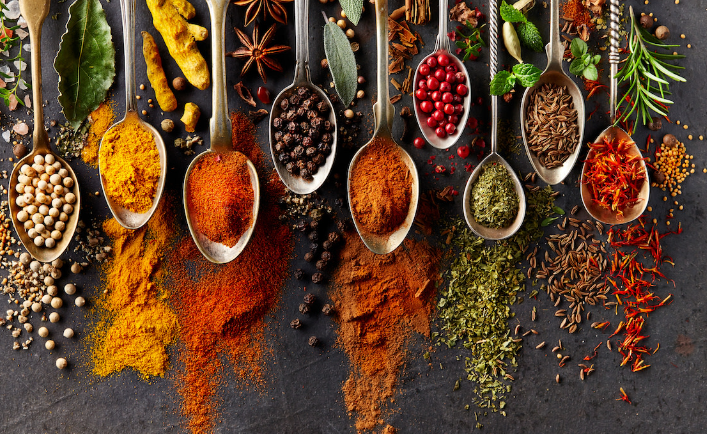
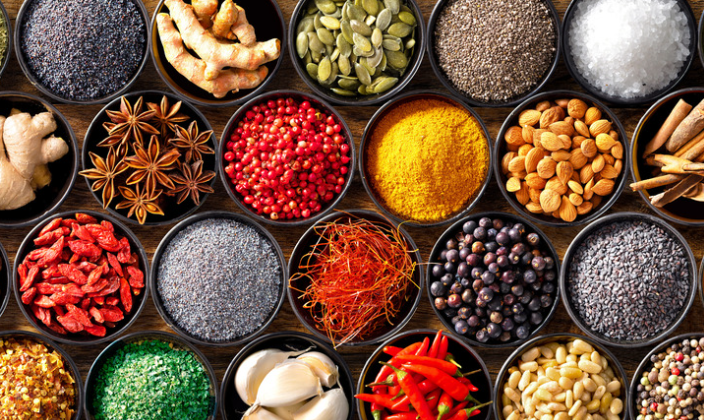
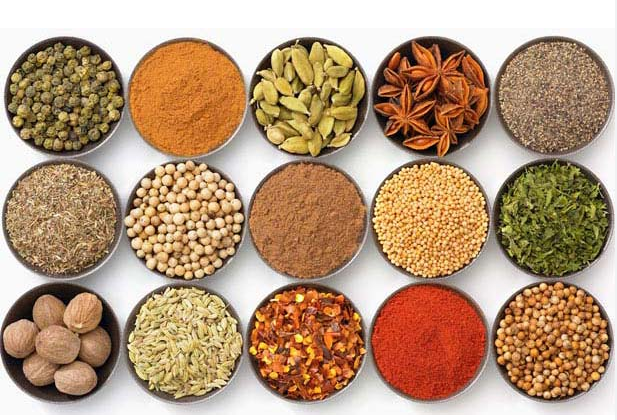
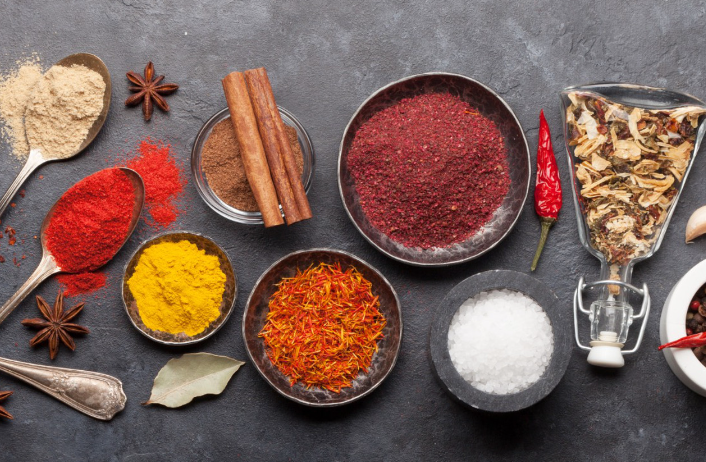
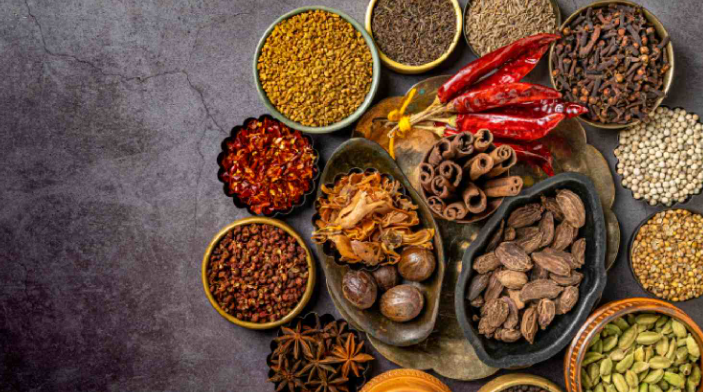
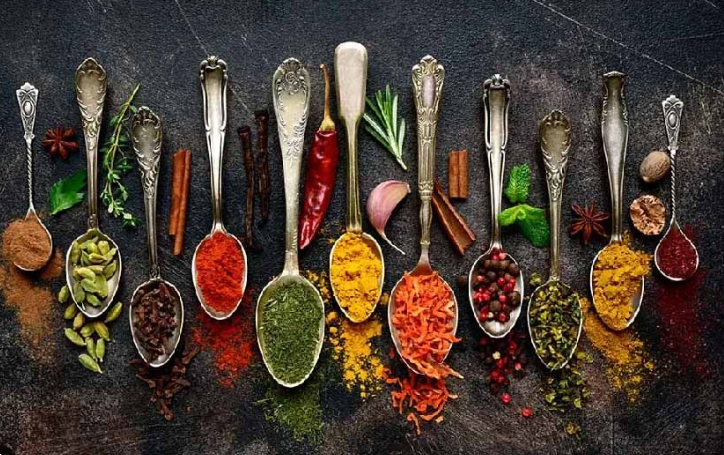
Basil:
- Nutrition Facts:
One tablespoon (approximately 2 grams) of fresh chopped basil provides:
- Calories: 0.6
- Vitamin A: 3% of the Recommended Daily Intake (RDI)
- Vitamin K: 13% of the RDI
- Calcium: 0.5% of the RDI
- Iron: 0.5% of the RDI
- Manganese: 1.5% of the RDI
- Health Benefits:
- Antioxidant Properties: Basil contains beneficial plant compounds that act as antioxidants, protecting cells from oxidative damage.
- Anti-Inflammatory Effects: The essential oils in basil have anti-inflammatory properties.
- Digestive Health: Basil aids digestion and may relieve indigestion, bloating, and gas.
- Flavorful Addition: Basil adds a unique flavor to sauces, salads, and soups.
**Remember, Basil not only enhances the taste of your dishes but also offers potential health benefits!
Bay Leaves:
- Nutrition Facts:
One tablespoon (approximately 1.8 grams) of bay leaf provides:
- Calories: 6
- Fat: 0.2 grams
- Sodium: 0.4 grams
- Carbohydrates: 1.4 grams
- Fiber: 0.5 grams
- Protein: 0.1 grams
- Iron: 0.8 milligrams
- Magnesium: 2.2 milligrams
- Vitamin A: 5.6 micrograms.
- Health Benefits:
- Antioxidant Properties: Bay leaves contain phytochemicals like flavonoids and proanthocyanidins, which act as antioxidants and protect against oxidative stress caused by free radicals.
- Antibacterial and Antimicrobial Effects: Bay leaves have been shown to have antibacterial properties against various bacteria, including those causing foodborne illnesses.
- May Provide Other Health Benefits: Researchers are investigating additional compounds in bay leaves for potential health benefits.
Remember, Bay Leaves not only enhance the flavor of your dishes but also offer potential health advantages
Bishop’s seed, (Ajwain/Aajowan/ Caraway or Carom):
Bishop’s seed, also known as ajwain, ajowan caraway, or carom, is an annual herb in the family Apiaceae. It produces small, seed-like fruits with a strong, bitter taste and an aroma similar to thyme. Here are some key details about ajwain:
- Health Benefits:
- Digestive Health: Ajwain seeds contain active enzymes that improve stomach acid flow, relieving indigestion, bloating, and gas. They can also help treat peptic ulcers and sores in the digestive tract.
- Infection Prevention: Essential oils in ajwain, particularly thymol and carvacrol, fight bacteria and fungi. They may combat bacteria like salmonella and E. coli, which can cause food poisoning and stomach issues.
- Lower Blood Pressure: Research in rats suggests that thymol in ajwain may help lower blood pressure by preventing calcium from entering heart blood vessels.
- Cough and Congestion Relief: Ajwain provides relief from coughing and helps clear nasal mucus, making breathing easier. It may also widen bronchial tubes, benefiting those with asthma.
- Toothache Relief: Thymol’s anti-inflammatory properties can reduce toothache pain and improve oral health by fighting mouth bacteria and fungi.
- Arthritis Pain Relief: Crushed ajwain fruit paste can soothe joint pain and swelling. A handful of seeds in a warm bath can also provide a soothing effect.
- Nutrition:
- Ajwain is rich in fiberand minerals, but since the typical serving size is low, you won’t get significant nutrition from eating them.
- A single serving (one teaspoon) of ajwain contains:
- Calories: 5
- Protein: Less than 1 gram
- Fat: Less than 1 gram
- Carbohydrates: 1 gram
- Fiber: 1 gram
- Sugar: 0 grams
Ajwain is a flavorful spice commonly used in Indian cuisine. Incorporate it into your dishes to enjoy its taste and potential health benefits!
Cambodia:
- Malnutrition Burden:
- Cambodia faces significant challenges related to malnutrition:
- Stunting: Approximately 4% of children under 5 yearsare affected by stunting, which is higher than the average for the Asia region.
- Wasting: 7% of children under 5 yearsare affected by wasting, also higher than the regional average.
- Anemia: 1% of women aged 15 to 49 yearsare affected by anemia.
- Low Birth Weight: 1% of infantshave a low weight at birth.
- Exclusive Breastfeeding: 2% of infants aged 0 to 5 monthsare exclusively breastfed.
- Childhood Overweight: 2% of children under 5 yearsare overweight.
- Adult Obesity: 0% of adult womenand 3.5% of adult men are living with obesity.
- Diabetes: 9% of adult womenand 9.1% of adult men are estimated to have diabetes.
- Cambodia faces significant challenges related to malnutrition:
- Diet-Related Non-Communicable Disease (NCD) Targets:
- Cambodia has shown limited progresstowards achieving diet-related NCD targets.
- The prevalence of obesityis lower than the regional average for both women and men.
- However, diabetesremains a concern.
- Diet and Infant Feeding:
- Key indicators for infant and young child feeding include:
- Early initiation of breastfeeding
- Exclusive breastfeeding
- Introduction of solid, semi-solid, or soft foods
- Continued breastfeeding 12-23 months
- Minimum dietary diversity
- Minimum meal frequency
- Minimum acceptable diet
- Key indicators for infant and young child feeding include:
**Remember, addressing malnutrition and promoting healthy diets are crucial for Cambodia’s overall well-being!
Capers:
- Nutrition Facts:
- Capers are small, pickled flower buds that add saltiness and tang to dishes.
- Each serving of capers provides a low number of calories and few grams of carbs, fat, and protein.
- A tablespoon (9 grams) of canned capers contains:
- Calories: 2
- Protein: 0.2 grams
- Carbs: 0.4 grams
- Fiber: 0.3 grams
- Sodium: 9% of the Daily Value (DV)
- Copper: 4% of the DV
- Vitamin K: 2% of the DV
- Riboflavin: 1% of the DV
- Iron: 1% of the DV
- Magnesium: 1% of the DV
- Health Benefits:
- Antioxidant Properties: Capers are rich in antioxidants like quercetin and rutin, which may reduce inflammation and promote healthy blood sugar levels.
- Weight Management: Capers are low in calories and can be a flavorful addition to a healthy weight-loss diet.
- Good Source of Flavor: Despite their small size, capers pack quite a punch in terms of flavor and can enhance various dishes.
Remember, while Capres are high in sodium, using them sparingly can add a burst of flavor to your meals!
Caraway Seeds:
- Nutrition Facts:
- One tablespoon (approximately 6.7 grams) of caraway seeds contains:
-
- Calories: 22
- Protein: 1.3 grams
- Fat: 0.9 grams
- Carbohydrates: 3.34 grams
- Fiber: 2.6 grams
- Copper: 6.7% of the Daily Value (DV)
- Iron: 6.1% (for women)
- Magnesium: 5.4% of the DV
- Manganese: 4.8% (for women)
- Calcium: 3.6% of the DV
- Zinc: 4.6% (for women)
- Health Benefits:
- Reducing Inflammation: Caraway compounds have strong antioxidant and anti-inflammatory properties. In a study with mice, caraway extract reduced inflammation in colon tissue as effectively as common steroid-based drugs.
- Encouraging Healthy Digestion: Caraway oil relaxes the smooth muscle tissue of the digestive tract, relieving indigestion symptoms like gas, cramping, and bloating.
- Recommended Quantity:
- Use caraway seeds in a variety of dishes, both sweet and savory, such as breads, pastries, curries, and stews.
- Enjoy its slightly bitter, earthy flavor reminiscent of licorice, coriander, anise, and fennel.
**Remember, Caraway not only enhances the taste of your meals but also offers potential health benefits!
Cardamom:
- Nutrition Facts:
- One tablespoon (approximately 6 grams) of ground cardamom contains about:
- Calories: 18
- Total Fat: 0.4 grams
- Carbohydrates: 4.0 grams
- Fiber: 1.6 grams
- Protein: 0.6 grams
- Manganese: 1.6 milligrams (80% of the Daily Value)
- One tablespoon (approximately 6 grams) of ground cardamom contains about:
- Health Benefits:
- Antioxidant and Diuretic Properties May Lower Blood Pressure: Cardamom may help people with high blood pressure. Antioxidants in cardamom contribute to this effect, and it may also act as a diuretic, promoting urination to reduce water buildup around the heart.
- May Contain Cancer-Fighting Compounds: Studies in mice suggest that cardamom may enhance enzymes that fight cancer and improve natural killer cell activity against tumors. However, human research is needed for stronger claims.
- Digestive Health: Cardamom has been used traditionally to aid digestion and treat digestive problems.
- Freshens Breath: Chewing cardamom seeds can help freshen breath.
- May Prevent Cavities: Cardamom has antimicrobial properties that may help prevent cavities.
Remember, Cardamom not only adds a delightful flavor to your dishes but also offers potential health benefits!
Cassia/Cassia Cinnamon:
Cassia cinnamon (Cinnamomum aromaticum) is made from the dried inner bark of an evergreen tree. It’s the most common type of cinnamon sold in North America.
- Nutrition Facts (per 1 cup, 103 grams of raw cassava):
- Calories: 165
- Fat: 0.3g
- Sodium: 14.4mg
- Carbohydrates: 39g
- Fiber: 1.9g
- Sugars: 1.8g
- Protein: 1.4g
- Cassava is high in potassiumand vitamin C. It also contains most of the B-vitamins (except B12), vitamin A, magnesium, selenium, calcium, and iron.
- Cassava is a great source of carbohydrates and provides high amounts of vitamin C and potassium.
- Health Benefits:
- May lower the risk of metabolic syndromewhen replacing wheat as a staple food.Rich in vitamin C, which promotes wound healing.
Cassava Leaves
- Cassava leaves are edible and a good source of protein.
- They can be used in pilafs, curries, and meat dishes.
Remember, cassava not only provides essential nutrients but also offers potential health benefits!
Celery:
One medium celery stalk (approximately 7 1/2″ to 8″ long) contains the following nutrients:
Nutrition Facts:
Calories: 5.6
Fat: 0.1g
Sodium: 32mg
Carbohydrates: 1.2g
Fiber: 0.6g
Sugars: 0.5g
Protein: 0.3g
Potassium: 104mg
Phosphorus: 9.6mg
Vitamin A: 8.8mcg
Folate: 14.4mcg
Vitamin K: 11.7mcg.
- Health Benefits:
- Reducing Inflammation: Celery contains approximately 25 anti-inflammatory compounds, including vitamin C, beta carotene, and flavonoids.
- Aids in Diabetes Prevention and Management: Celery leaf extract has been shown to reduce blood sugar levels in older adults with pre-diabetes.
- Hydration: With its high water content, celery is great for staying hydrated.
- Low-Calorie Option: Celery is a popular choice on low-carbohydrate diets due to its minimal calories and carbohydrates.
- Recommended Quantity:
- Incorporate celery into your diet by adding it to salads and soups, or enjoying it as a snack.
- It’s a nutrient-rich vegetable that provides fiber, potassium, and folate.
**Remember, celery not only adds crunch to your meals but also offers potential health benefits!
Chili Peppers:
- Nutrition Facts:
- One tablespoon (approximately 15 grams) of raw, fresh, red chili peppers provides the following nutrients:
- Calories: 6
- Water: 88%
- Protein: 0.3 grams
- Carbohydrates: 1.3 grams
- Sugar: 0.8 grams
- Fiber: 0.2 grams
- Fat: 0.1 grams.
- One tablespoon (approximately 15 grams) of raw, fresh, red chili peppers provides the following nutrients:
- Vitamins and Minerals:
- Chili peppers are rich in various vitamins and minerals, although their contribution to daily intake is small due to their consumption in small amounts:
- Vitamin C: A powerful antioxidant important for wound healing and immune function.
- Vitamin B6: Essential for energy metabolism.
- Vitamin K1: Essential for blood clotting and bone health.
- Potassium: Supports heart health.
- Copper: Important for strong bones and healthy neurons.
- Vitamin A: High in beta carotene, which converts to vitamin A.
- Chili peppers are rich in various vitamins and minerals, although their contribution to daily intake is small due to their consumption in small amounts:
- Bioactive Plant Compounds:
- Capsaicin: The main bioactive compound responsible for chili peppers’ pungent taste and health benefits.
- Carotenoids: Chili peppers contain antioxidant carotenoids, such as capsanthin and violaxanthin, linked to various health benefits.
- Health Benefits:
- Antioxidant Properties: Capsaicin and carotenoids contribute to chili peppers’ antioxidant effects.
- Heart Health: Potassium content may reduce heart disease risk.
- Anti-Inflammatory Effects: Carotenoids are associated with reduced inflammation.
- Blood Sugar Management: Some evidence suggests chili peppers may help manage blood sugar levels.
Remember, incorporating chili peppers into your diet not only adds spice but also offers potential health benefits!
Cinnamon:
- Nutrition Facts:
- One tablespoon (approximately 7.8 grams) of cinnamon contains:
- Calories: 19
- Total Fat: 0.1 grams
- Total Carbohydrate: 6 grams
- Dietary Fiber: 4.1 grams
- Protein: 0.3 grams
- Calcium: 78.2 milligrams
- Iron: 0.6 milligrams
- Magnesium: 4.7 milligrams
- Vitamin C: 0.3 milligrams
- Vitamin A: 1.2 micrograms
- Potassium: 34 milligrams
- Sodium: 1 milligram
- Cinnamon is low in calories and fat but rich in micronutrients like calcium, magnesium, and iron.
- One tablespoon (approximately 7.8 grams) of cinnamon contains:
- Health Benefits:
- Antioxidant Properties: Cinnamon contains powerful antioxidants, including Cinnamaldehyde, which may contribute to its health benefits.
- Anti-Inflammatory Effects: The antioxidants in cinnamon have anti-inflammatory properties, potentially reducing the risk of chronic diseases.
- Blood Sugar Management: Some studies suggest that cinnamon may help manage blood sugar levels, especially in people with diabetes.
- Heart Health: Cinnamon may lower cholesterol levels and support heart health.
- Anti-Inflammatory Effects: Cinnamon’s compounds have anti-inflammatory effects, which may contribute to overall well-being
Clove:
- Nutrition Facts:
- One teaspoon (approximately 2 grams) of ground cloves contains:
- Calories: 6
- Carbohydrates: 1 gram
- Fiber: 1 gram
- Manganese: 55% of the Daily Value (DV)
- Vitamin K: 2% of the DV.
- One teaspoon (approximately 2 grams) of ground cloves contains:
- Health Benefits:
- Antioxidants: Cloves are rich in antioxidants, including the compound eugenol, which acts as a natural Including cloves in your diet can improve overall health by reducing oxidative stress.
- Liver Health: Some animal studies suggest that clove extract may improve liver damage caused by toxic substances. The compound eugenol may be particularly beneficial for liver health.
- Potential Cancer Protection: Eugenol in clove oil has shown anticancer properties in test-tube research, particularly promoting cell death in breast cancer cells. However, further research is needed to understand its effects in humans 1.
- Antimicrobial Properties: Cloves have been shown to have antimicrobial properties, helping stop the growth of bacteria.
- Risks:
- Clove oil can be toxic in high amounts, especially in children, and may cause liver damage. Moderation is key.
- How to Use:
- Cloves are versatile and can be used in various ways:
- Season pot roasts.
- Add flavor to hot beverages.
- Enhance cookies and cakes.
- Incorporate cloves into your diet to enjoy their unique flavor and potential health benefits!
- Cloves are versatile and can be used in various ways:
**Remember, cloves not only add a sweet and aromatic touch to your dishes but also offer potential health advantages!
